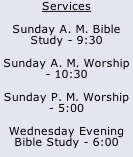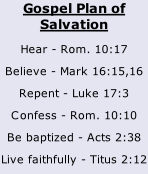








We are living in a time of "relative ethicists," or, those who advocate that truth and goodness are "in the eye of the beholder." These pseudo-
Certainly if one were to consider the Bible at all in answering the question, "What is truth?", fairness would dictate that one must listen to the entire testimony of Scripture on this (or any) subject. After all, the spiritually groping heathen Pilate asked the very one who is "the Truth" (John 14:6), "What is truth?" (John 18:38). The Bible itself, then, asks the question. But it also provides a clear, unequivocal response adequate to rebut today's absurd consensus on truth. What is God's full definition of truth?
TRUTH IS ABSOLUTE
The truth that the Bible speaks of is absolute (singular, fixed, no exceptions unless stated). The Bible repeatedly speaks of Jesus' and his apostles' teachings as "the truth" (not the truths or a truth). This signifies that a specific realm or body of teaching is meant. Jesus said to his apostles, "Howbeit when he, the Spirit of truth, is come, he shall guide you into all the truth . . ." (John 16:13). "But unto them that are factious, and obey not the truth, but obey unrighteousness, shall be wrath and indignation . . (Romans 2:8). "Demetrius hath the witness of all men, and of the truth itself: yea, we also bear witness; and thou knowest that our witness is true" (III John 12). "In whom ye also, having heard the word of the truth, the gospel of your salvation ... ye were sealed with the Holy Spirit of promise" (Ephesians 1:13).
It is interesting that "the truth" (as a specific and definite realm) is clearly distinguished from "error" in the Bible. John says "we know the spirit of truth, and the spirit of error" (I John 4:6).
TRUTH IS KNOWABLE
The Bible says that this definite realm called "the truth" is "knowable" to all men. But immediately some "might object, "You are claiming to be God if you say you can know all the truth." Obviously human minds cannot comprehend all things of God, but this is not to say human minds cannot grasp or know any of the truth. It is just as false to say, "I know all the truth" as it is to say, "I cannot know any truth." There is some truth I can know and must know in order to be eternally saved.
There are numerous Bible declarations that we can know (some things) in this definite realm called "truth." Jesus said, "And ye shall know the truth, and the truth shall make you free" (John 8:32). First Timothy 2:4 teaches that God "would have all men to be saved, and come to the knowledge of the truth." God grants "repentance unto the knowledge of the truth" (II Timothy 2:25). Some are "ever learning, and never able to come to the knowledge of the truth" (II Timothy 3:7), not because it is impossible to do so (John spoke of them "that know the truth" in II John 1), but because they are not honest enough to receive it. "For if we sin wilfully after that we have received the knowledge of the truth, there remaineth no more sacrifice for sins" (Hebrews 10:26).
Again, someone might object, "Yes, one can know the truth, but it is only as one sees it." How should this be responded to? First, it should be noted that the Bible writers do not say one comes to "a knowledge" or "the knowledges" of the truth (as a subjective interpretation would require), but one comes to "the knowledge of the truth." "The" is the definite article implying specificity, hence, specific knowledge of the definite realm called truth.
Second, consider the logical absurdities of subjectivism or relative ethics. If relative ethics be true, then I can ethically reject relative ethics. (If, on the other hand, some things are absolutely wrong, then I am absolutely wrong in rejecting the truth that says some things are absolutely wrong.) To say, "No truth is know-
"Pilate saith unto him (Jesus), What is truth?" (John 18:38). "Jesus saith unto him (Thomas), I am ... the truth . . ." (John 14:6). In prayer to the Father, Jesus said, "Thy word is truth" (John 17:17). "And hereby we know that we know him, if we keep his commandments. He that saith, I know him, and keepeth not his commandments, is a liar, and the truth is not in him" (I John 2:3,4). "Greater joy have I none than this, to hear of my children walking in the truth" (III John 4). Truth is absolute and knowable; and we can walk in it. Do not be among those who "received not the love of the truth, that they might be saved" (II Thessalonians 2:10). The truth alone will make men free (John 8:32).
Jeffery S. Stevenson, Gospel Advocate, December 15, 1983


